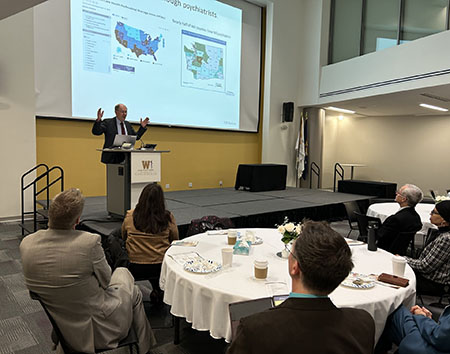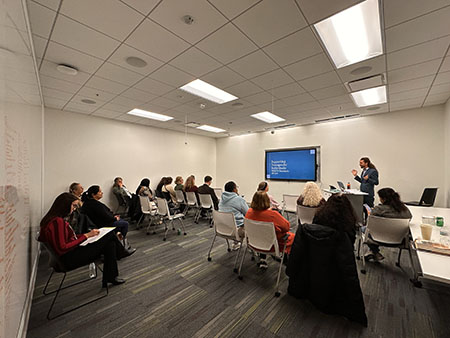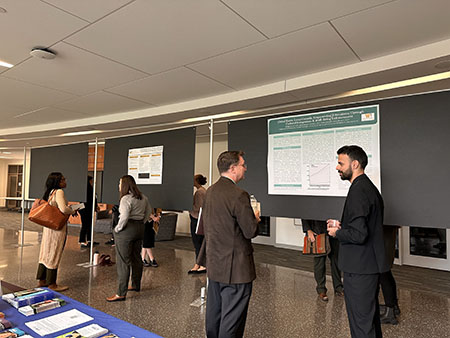
The medical school welcomed more than 150 people to the W.E. Upjohn M.D. Campus in November for the 7th Annual WMed Healthy Equity Summit.
The focus of this year’s event, which was held Friday, November 1, was mental health equity. The free, full-day event featured several morning and afternoon workshops covering important topics, including combatting disparities in mental health care.
“This was the right time for us to all come together to talk about mental health,” explained Cheryl Dickson, MD, MPH, the medical school’s associate dean for Health Equity and Chief Diversity Officer. “We’re seeing this burgeoning need for more mental health providers and access to care, and that with that access, there’s also disparities.”
This year’s summit was developed in collaboration with Eric Achtyes, MD, MA, DFAPA, chair of the Department of Psychiatry at WMed, and Roger Apple, PhD, associate professor in the departments of Psychiatry and Pediatric and Adolescent Medicine, and director of the WMed Pediatric Autism Center.

“I was absolutely thrilled when I learned that the theme for this year’s health equity summit would be mental health equity,” Dr. Achtyes said. “After all, there is no health equity without mental health equity.”
Attendees at this year’s symposium heard opening remarks from Dr. Dickson and a welcome message from WMed Dean Robert G. Sawyer, MD.
The morning keynote address, “Leveraging Psychiatry to Improve Population Health,” was presented by Jürgen Unützer, MD, MPH, MA. Dr. Unützer is a professor of Psychiatry and Behavioral Sciences at the University of Washington School of Medicine. He also serves as director of the Garvey Institute for Brain Health Solutions.
During his hour-long presentation, Dr. Unützer outlined the tremendous unmet need for mental healthcare in the United States and abroad. He shared data about efforts to better train additional people to address mental health concerns, from different members of the healthcare team to members of the lay community.
“The way out of all of this is to really think much more broadly about who is a mental health provider, who could have what level of skill, how do we help each other, because the truth is none of us have everything we need, but if we work together, it might make a difference,” Dr. Unützer said.

This year’s summit also featured four workshop sessions for attendees that covered several important topics, including standards of care for trans individuals, strategies for reducing mental health inequities in Black and Brown communities and combatting disparities in mental health care. Featured speakers included Janeé Steele, PhD, LPC, Kalamazoo Cognitive and Behavioral Therapy, PLLC; Dusty Jepkema, clinical social worker, Kalamazoo Community Mental Health; Farha Abbasi, MD, assistant professor, Department of Psychiatry, Michigan State University; and Carla Adkison-Johnson, PhD, professor, Department of Counselor Education and Counseling Psychology, Western Michigan University.
The afternoon keynote address, “Everybody vs. Stigma: The Power of Advocacy,” was presented by Kevin Fischer, executive director of NAMI Michigan. NAMI – the National Alliance on Mental Illness – serves as the nation’s largest grassroots mental health organization dedicated to improving the lives of persons living with serious mental illness and their families.

Fischer shared the heartbreaking story of the loss of his son, Dominique, to suicide, highlighting how stigma around obtaining mental health treatment may have led to his son’s death. Additionally, he outlined the need for grassroots organizations, like NAMI, to provide education and support to individuals suffering with mental illnesses, and their families.
The summit also featured a poster showcase where students and other members of the WMed community got the chance to highlight projects focusing on health equity in the categories of clinical, public health, medical education scholarship, social and behavioral sciences, and quality improvement.
“I was so pleased with the breadth and depth of expertise brought by our speakers,” Dr. Achtyes said. “These keynote addresses were flanked by workshops helping to educate attendees about the biases and stigma affecting both the ability to access care as well as the quality of care provided to those with mental health conditions. We look forward to the positive changes that will undoubtedly occur as a result of this event.”
